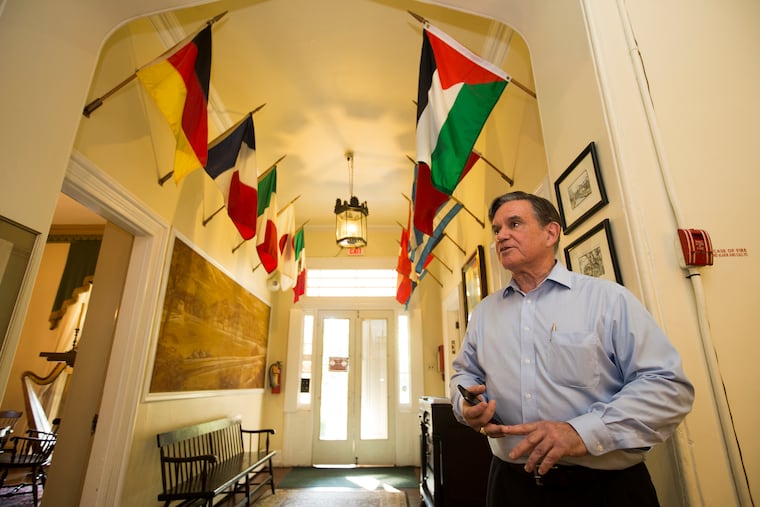Fairmount Park’s Chamounix Mansion youth hostel wins tax case against city
The judge's ruling settles a bizarre dispute pitting the city government against a nonprofit organization created with the support of the city to maintain a city-owned property.

A Philadelphia judge has ruled that the city’s attempt to collect $378,000 in delinquent hotel taxes from the Chamounix Mansion youth hostel is invalid, siding with the historic building’s nonprofit operator and two former mayors who testified that guests at the unique Fairmount Park institution should not be subject to the tax.
Common Pleas Court Judge Lori A. Dumas wrote that the hotel-tax law applies the 8.5% levy to payments for “the use or occupancy by a transient of a room or rooms.” Because hostels like Chamounix charge visitors by the bed, not the room, and house occupants in dormitory-like group settings, the city cannot apply the tax, she wrote.
Additionally, Dumas found that the city failed to prove that it provided proper notice to the Friends of Chamounix Mansion that it was planning to retroactively assess the tax, which the hostel has never paid, for the years 2008 through 2013. The nonprofit said it never received notice about the change in the city’s approach to the hotel tax until being contacted by a debt collection firm.
Unless the city appeals the decision, Dumas’ ruling brings to an end a bizarre case pitting the city government against a nonprofit organization created in 1965 with the support of the city to maintain a city-owned property.
Former Mayors Ed Rendell and Michael Nutter testified against the city’s current position, saying they believed the mansion to be a unique entity that was never intended to be treated like a hotel. The Department of Licenses and Inspections classifies it as Philadelphia’s only “youth hostel,” which has no definition in city law.
Mayor Jim Kenney’s administration, however, pressed forward with the case, which stemmed from a Department of Revenue audit, and has not yet indicated whether it will appeal the ruling.
“The City is reviewing the decision and considering its options,” Kenney spokesperson Mike Dunn said. “But to be clear, this is not a tax on the nonprofit entity. It is a tax on the entity’s patrons that it is required, but failed, to collect — just as merchants are required under the law to collect sales tax.”
Bill O’Brien, a lawyer who chairs Chamounix’s volunteer board, said he was relieved the nonprofit would not be on the hook for the tax bill, which he testified could have forced the hostel to close permanently. With penalties and fees, the back payments would have cost close to $500,000.
“It was a mistake and it was misguided, and the courts’ decision indicates that we were correct,” O’Brien said. “It was an unnecessary distraction, and so now we can focus on only the pandemic. Lucky us.”
Built in 1802, Chamounix Mansion was originally the summer home of the Plumsted family, which included two early Philadelphia mayors. Later, after Chamounix Drive was built and became a popular racetrack, the mansion often served as a grandstand of sorts for spectators.
In the 20th century, when Chamounix and other Fairmount Park mansions were left vacant and fell into disrepair, the city allowed municipal employees to live in the homes to maintain them and keep out squatters. But after a corruption scandal over the arrangement, the mansion was vacated again and fell prey to vandalism and fires.
When the building was slated to be demolished in the 1960s, a group of young, civic-minded Philadelphians approached the city with an idea for a youth hostel, leading to the formation of the nonprofit, which has a $1-per-year lease with the city, raises money for repairs, and operates the youth hostel.
The purpose of a youth hostel, O’Brien said, “is to encourage young people to come and learn about Philadelphia, and for Philadelphians to learn about people from other cultures, and to do that in a safe, clean, inexpensive venue.”
Visitors, many of whom often come in groups from churches or Boy Scout troops, pay $25 per night to stay in bunk beds. Although they can stay multiple nights, the building is closed to visitors from 11 a.m. to 4:30 p.m., encouraging the guests to explore the city.
The hostel has been closed since March 13, and O’Brien said it likely won’t be able to reopen until the coronavirus pandemic ends. The same reason the hostel is not subject to the tax is also the reason it cannot stay open during the public health crisis, as hotels can.
“I don’t know that there’s any [social distancing] protocol that we could employ and represent that a dormitory with 12 strangers could be safe,” O’Brien said. “So until this gets under control through herd immunity or vaccinations, we’ll continue to be in limbo.”